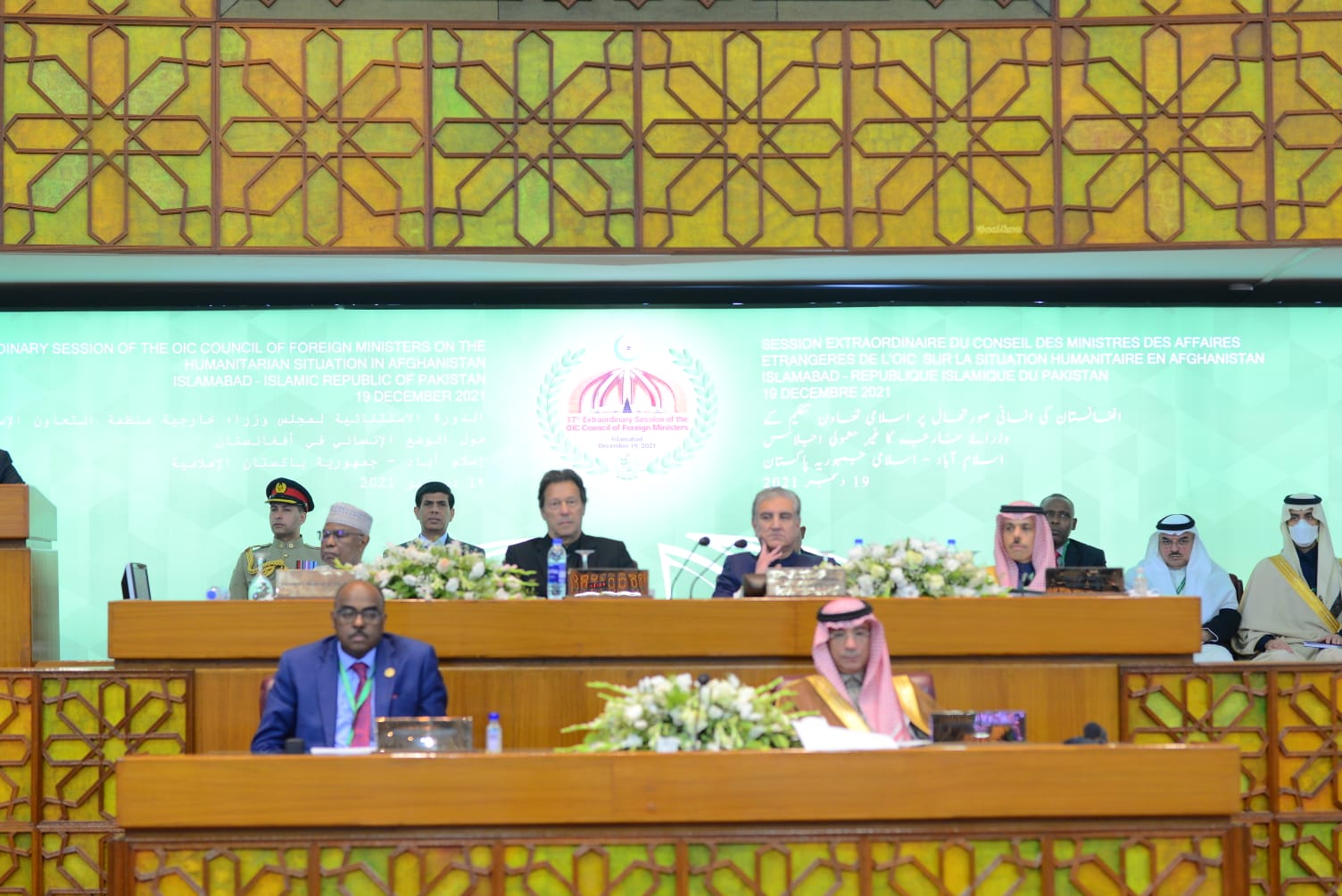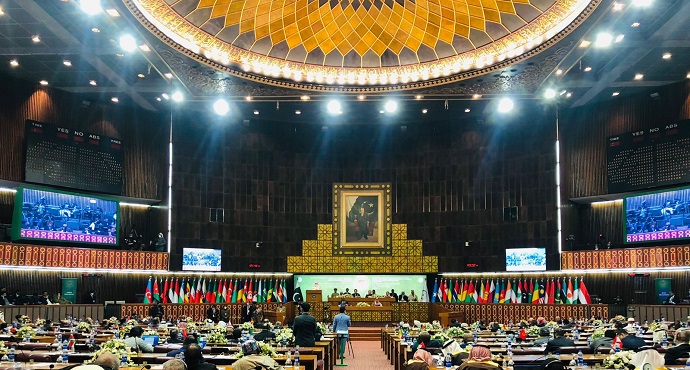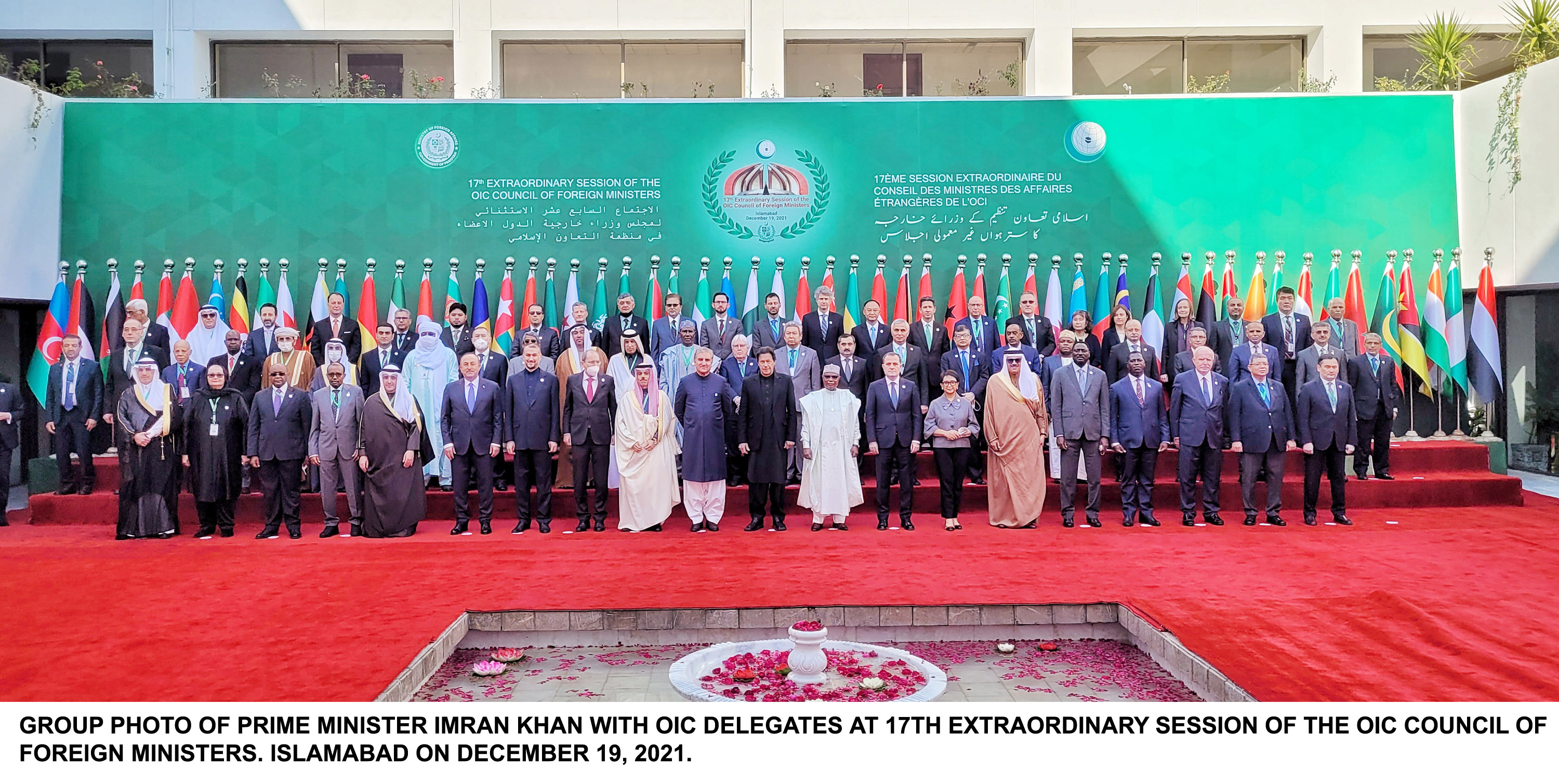Highlights of the Organization of Islamic Conference Summit on Afghanistan
IRIA Staff - December 20, 2021

Pakistan held the 17th Extraordinary Session of the Organization of Islamic Cooperation (OIC) Council of Foreign Ministers on the “Humanitarian Situation in Afghanistan” on December 19, in Islamabad under Pakistani Prime Minister Imran Khan’s leadership.
The OIC members have pledged to set up a humanitarian trust fund for Afghanistan where millions face hunger and poverty. The trust fund will be set up under the aegis of the Islamic Development Bank. They also agreed to launch a comprehensive food security program for Afghan people.
The representatives from OIC member states and other stakeholder countries discussed the “humanitarian, social, and economic situation” in Afghanistan. The foreign ministers of Saudi Arabia, Tukey, Oman, Azerbaijan, Iran, Kuwait, Indonesia, and Malaysia attended the summit. The meeting was also attended by the Taliban delegation led by the interim foreign minister.
The OIC Secretary-General Hissein Brahim Taha announced the appointment of Assistant Secretary-General for Humanitarian, Cultural and Social Affairs Ambassador Tariq Ali Bakheet as Special Envoy on Afghanistan, to follow up on the implementation of the resolution of the Council of Foreign Ministers and coordinate efforts for the supply of humanitarian assistance to the Afghan people.
Pakistani Foreign Minister Shah Mahmood Qureshi stated that the meeting organized by the Organization of Islamic Cooperation (OIC) mainly aims to resolve the imminent humanitarian crisis in Afghanistan by turning the world’s attention to the war-torn country, and does not constitute official recognition of the Taliban regime.
“Unless action is taken immediately, Afghanistan is heading for chaos,” Prime Minister Imran Khan told the OIC summit attended by 70 delegations from more than 50 countries. “Any government when it can’t pay its salaries for its public servants, hospitals, doctors, nurses, any government is going to collapse but chaos suits no one, it certainly does not suit the United States,” he warned.

United Nations’ Undersecretary-General on Humanitarian Affairs Martin Griffiths warned that Afghanistan’s economy was “now in free fall” and said that “If we don’t act decisively and with compassion, I fear this fall will pull the entire population with it.”
The session’s draft resolution welcomed Saudi Arabia’s initiative for convening the OIC summit of Foreign Ministers and praised Pakistan’s efforts for hosting the meeting on the humanitarian situation in Afghanistan.
The resolution strong reaffirmed the strong commitment of the OIC Member States to the sovereignty, independence, territorial integrity, and national unity of Afghanistan, and underlined “the importance of investing in human development for achieving sustainable peace and development in the country.”
The member states expressed “deep alarm at the deteriorating humanitarian crisis in Afghanistan, in particular, the warning issued by the World Food Programme that 22.8 million people - more than half the population of Afghanistan - face acute food shortage; 3.2 million children and 700,000 pregnant and lactating women are at a risk of acute malnutrition,” and reiterated solidarity with the people of Afghanistan and highlighted their commitment to bring security and stability in the war-torn country.
The official draft resolution also noted with deep concern that the breakdown of Afghanistan’s health system, disease outbreaks, and severe malnutrition, in particular in the face of the Covid-19 pandemic.
The OIC member states highlighted the importance of protecting and respecting the right to life, security, and dignity of the people of Afghanistan in compliance with the Islamic principles and the Universal Declaration of Human Rights, and emphasized “the importance of establishing inclusive governmental structures which adopts moderate and sound domestic and foreign policies, with a friendly approach towards neighbors of Afghanistan, aimed at realizing the shared goals of durable peace, security, safety and long-term prosperity of Afghanistan and the region.”
The participating states also emphasized “the importance of meaningful participation of women in all spheres, and upholding human rights, including for women, children, and minorities,” and stressed that “the Afghan territory must not be used as a base or safe haven for any terrorist group,” the statement added.
The OIC members also requested the organization’s Secretary-General “to arrange for a delegation of prominent religious scholars and Ulama led by the International Islamic Fiqh Academy and other relevant religious institutions, to engage with Afghanistan on issues of vital concern, such as, but not limited to, tolerance and moderation in Islam, equal access to education and women’s rights in Islam”.
According to the statement the OIC Secretary-General has also been requested “to present a report to the 48th session which identifies measures to address the humanitarian and economic situation in Afghanistan as well as to highlight any practical difficulties being faced in the provision of humanitarian aid or related funds, financial assets, or economic resources to Afghanistan by the OIC Member States, OIC financial and humanitarian institutions and organizations.”

Pakistani foreign minister said that 75% of Afghanistan’s budget relies on external aid. He pointed out that the country’s 9.5 billion U.S. dollar currency reserves have been frozen.
The summit participants called for the unfreezing of billions of dollars in central bank reserves and lift sanctions to allow aid to flow into Afghanistan. Pakistan’s foreign minister said unlocking financial and banking channels was essential “because the economy can’t function and people can’t be helped without a banking system”.
Qureshi earlier stated that “The OIC Extraordinary session in Islamabad would prove to be a stepping stone in finding solutions to the humanitarian crisis in Afghanistan and this was also an opportunity for world capitals to know about ground realities from Taliban representatives.”
Pakistan proposed a six-point strategy to resolve the Afghanistan crisis
At the OIC summit, Pakistan’s foreign minister proposed a six-point framework for the OIC to help the Afghan people:
1) Create a forum within the OIC to send immediate humanitarian and financial support to the Afghan people.
2) Increase investment in areas such as education, health and technical skills to support Afghan youth.
3) A group of experts comprising the OIC, the UN and international financial institutions should be set up to facilitate Afghanistan access to banking services, and ease the liquidity challenges faced by the Afghan people.
4) Improve food security for the Afghan people.
5) Invest in capacity building of Afghan institutions in countering terrorism and combating illicit trade in narcotics.”
6) Engage with Afghan authorities to help meet the expectations of the international community regarding political and social inclusivity, respect for human rights, especially the rights of women and girls and combating terrorism.

The OIC leaders agreed that continuous chaos and anarchy following the humanitarian crisis in Afghanistan would lead to the strengthening of terrorist organizations in the region. The delegates reaffirmed the importance of ensuring that the territory is not used as a platform or safe haven by any terrorist element. They urged Afghanistan authorities to “take concrete steps against all terrorist organizations, in particular, Al-Qaeda, Deash, and its affiliates, ETIM, and TTP.”
In addition to foreign ministers and observers from OIC the member states, the meeting also included special guests from the United Nations, international financial institutions, as well as some non-member states such as the United States, Russia, China, United Kingdom, France, Germany, Italy, and Japan.
Earlier on August 15, the Ashraf Ghani-led government in Afghanistan was overthrown by the Taliban. Since then, the country’s foreign assets have been frozen and Afghanistan is facing a severe financial crisis, and Afghan people are facing a severe risk of starvation and disease.
ALSO READ:
Regions
Issues

















 Highlights of ‘Troika Plus’ dialogue on Afghanistan
Highlights of ‘Troika Plus’ dialogue on Afghanistan Key takeaways from the G20 Summit held in Rome
Key takeaways from the G20 Summit held in Rome







